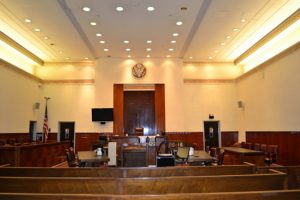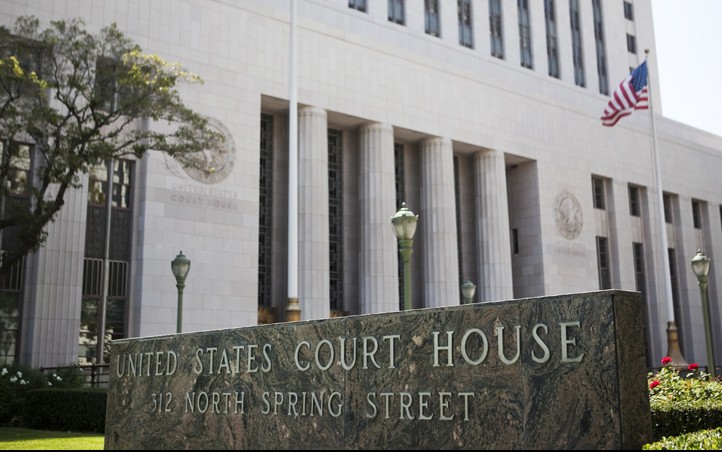LOS ANGELES
A federal grand jury issued a 10-count indictment against seven Los Angeles men for allegedly firebombing residents of blacks living in Boyle Heights section of Los Angeles, officials announced Thursday.
 The defendants were also charged for their roles in a racketeering enterprise that used violence and intimidation to control the perceived territory of the Big Hazard street gang, according to authorities.
The defendants were also charged for their roles in a racketeering enterprise that used violence and intimidation to control the perceived territory of the Big Hazard street gang, according to authorities.
On June 22, 2016, a federal grand jury returned an indictment under seal charging the defendants, all of whom are members and associates of the Big Hazard or Hazard Grande (Hazard) street gang, with a variety of violations stemming from the racketeering enterprise and related to the alleged firebombing that occurred on May 12, 2014, which was intended to drive blacks from the Ramona Gardens Housing Development.
The Ramona Gardens Housing is a federally and city funded housing development that is occupied primarily by Hispanic residents and located in Boyle Heights, officials said.
Carlos Hernandez, aka Creeper and Rider, 31; Jose Saucedo, aka Lil’ Moe, 22; Francisco Farias, aka Bones, 25; Joseue Garibay, aka Malo, 23; Edwin Felix, aka Boogie, 23; Jonathan Portillo, aka Pelon, 21; and Joel Matthew Monarrez, aka Gallo, 21, were charged with conspiracy to violate civil rights; conspiracy to use fire and carry explosives to commit another federal felony; attempted arson of federal property; using fire and carrying explosives to commit another federal felony; aiding and abetting; violent crime in aid of racketeering and interference with housing rights.
Hernandez and Farias were also charged with possessing, using, carrying a firearm during a crime of violence, and Felix was also charged with making a false statement to the FBI.
“The defendants used firebombs to drive the victims from their homes because of their race,” said Principal Deputy Assistant Attorney General Vanita Gupta, head of the Justice Department’s Civil Rights Division. “This is a hate crime. Such violence and intimidation have no place in our society.”
The Firebombing
The indictment alleges that, in early May, Hernandez led a Hazard meeting at a location in the gang’s territory near the Ramona Gardens Housing which was attended by the other defendants.
During the meeting, Hernandez allegedly told the group that they were going to use Molotov cocktails to firebomb residential units in the RGHD that were occupied by African-American families. According to the indictment, Hernandez allegedly told the defendants during the meeting that the purpose of the firebombing was to “get the n****** out of the neighborhood,” or words to that effect.
“Crimes targeting innocent people based on the color of their skin are among the most heinous crimes a community can suffer,” said U.S. Attorney Eileen M. Decker of the Central District of California. “In this case, the crime was particularly disturbing since the targets of the criminal conduct included children. As the indictment unsealed today demonstrates, criminals that fuel racial animosity will face severe consequences. All of our communities are made safer by removing these defendants, for whom violence and intimidation are tools of their trade, from the streets.”
On Mother’s Day, May 11, 2014, Hernandez instructed the other defendants to meet at a location in Hazard territory to prepare for the attack.
At the meeting, Hernandez distributed materials to be used during the firebombings, including disguises, gloves and other materials, according to the indictment.
The indictment alleges that Hernandez instructed the other defendants to split into groups, break victims’ windows in order to make clean entries, then ignite the firebombs and throw them into the victims’ residences in order to maximize damage.
The defendants also took precautions in order to avoid detection by law enforcement.
“This investigation resulted in one of the largest civil rights indictments in local history thanks to the tireless efforts put forth by agents working with detectives to build this case over the past two years,” said Assistant Director in Charge Deirdre Fike of the FBI’s Los Angeles Division. “The FBI is committed to seeking justice for the victims whose homes were barbarically firebombed as they put their children to bed, or anyone whose Constitutionally-protected right to happiness is threatened based on the color of their skin.”
Evidence gathered by investigators indicates this attack was motivated by hatred stemming from racial bias. Most of the victims of the firebombing were African-American families who were at home with their children, many of whom were minors.
“Hate crimes and arson are among the most heinous offenses that affect our community,” said Fire Chief Ralph M. Terrazas of the Los Angeles Fire Department (LAFD). “The LAFD greatly appreciates the tireless and collaborative efforts of the U.S. Attorney, FBI, ATF, LAPD and our own arson investigators, all of which assisted in the apprehension of the individuals accused in this case. We are hopeful that the U.S. Attorney will achieve a successful prosecution.”
The Racketeering Conspiracy
According to the indictment, the defendants were members and associates of the Hazard street gang, a criminal organization whose members engaged in, among other things, robbery, extortion, witness intimidation, trafficking and conspiracy to traffic in controlled substances.
The indictment further alleges that Hazard gang members promote the reputation of the criminal enterprise among other Hispanic gangs in Southern California and inside of state and federal prisons by carrying out Hazard leaders’ orders against rival gang members and perceived enemies.
Further, Hazard members maintain control and authority over its territory, often through threats, intimidation, civil rights crimes and other acts of violence, including murder.
Hazard members are known to retaliate against rival gang members who challenge Hazard’s authority or who fail to pay debts owed to Hazard members and associates.
The indictment further alleges Hazard members expose and punish fellow Hazard members who violate the gang’s rules, as well as expose and punish potential witnesses to crimes by Hazard members and associates who are suspected of cooperating with law enforcement or disrespecting Hazard members.
The indictment further alleges that Hazard members impose unwritten rules regarding the control of its territory, including that blacks reside in Ramona Gardens Housing at the pleasure of the gang and that they face retaliation and/or expulsion from Ramona Gardens Housing if they offend Hazard members.
“I am very proud of the partnerships between our agencies that enabled us to investigate and apprehend these violent offenders who preyed upon our community in a manner that will not be tolerated,” said Chief Charlie Beck of the Los Angeles Police Department.
“In a civil society, we cannot accept violence fueled by hatred, especially violence that seeks to deprive the freedoms we expect everyone has the right to enjoy,” said Special Agent in Charge Eric D. Harden of the ATF. “These arrests will hopefully bring peace of mind to both the residents of Ramona Gardens and the city of Los Angeles, and demonstrate that law enforcement is united against hate.”
The indictment alleges that the defendants and others conspired to injure, oppress, threaten and intimidate African American residents in violation of their constitutional rights, including the right to occupy a dwelling free from injury, intimidation and interference based on race and color.
The indictment alleges Hazard members would spray paint or “tag” gang monikers and symbols on businesses and residences, obtain and possess guns and other dangerous weapons in order to enforce the authority of the Hazard gang, intimidate rivals and residents and attack rivals and African Americans, among other things.
The defendants and others allegedly met to discuss ways to threaten, intimidate, and attack African Americans in their residences, on the streets and elsewhere, to deter them from living in Ramona Gardens because of their race and color.
Saucedo would confront African-American residents, including mixed-race children, and individually or collectively threaten them by telling them they were not welcome in Hazard gang territory, namely, Ramona Gardens Housing, and that they risked harm if they remained as residents.
If convicted of all counts listed in the indictment, Saucedo, Garibay, Portillo and Monarrez face a maximum sentence of 110 years in prison. Hernandez and Farias face a maximum sentence of life in prison, and Felix faces a maximum penalty of 115 years in prison.
The defendants are presumed innocent unless proven guilty.

